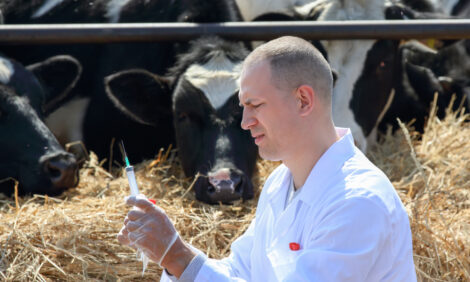



Drench Resistance a Growing Problem for Dairy Farmers
AUSTRALIA - A study has revealed that resistance to de-worming drugs is becoming a huge problem for many farmers.Leading the study, Australian Veterinary Association (AVA) spokesperson, Dr Stephanie Bullen from the University of Melbourne, said that introducing new drugs is not a viable solution.
“Heavy reliance on drenching in livestock industries has led to parasites developing resistance to anthelmintic drugs, particularly in the dairy industry.
“The results of our study indicate that there are very high levels of resistance on dairy farms.”
The study involved undertaking faecal egg count reduction tests to assess anthelmintic resistance on 20 dairy farms in the Macalister Irrigation District in Victoria between May 2013 and June 2014.
“Anthelmintic resistance was present on all 20 dairy farms involved in the study.
“The ultimate goal is to be able to achieve a balance between reducing the impact of parasites on farm profitability, while ensuring long term sustainability of current and future anthelmintics,” she said.
According to Dr Bullen, there’s an abundance of studies that demonstrate the importance of highly effective drenching drugs for dairy farm profitability.
“But for most farmers, drench resistance is a secondary consideration following the production advantages gained by their use.
“It’s also seldom recognised that once resistance develops, it’s virtually irreversible even after the use of a different class of drug.
“And earlier recommendations such as application of anthelmintics at set intervals and drench-and-move to safe pasture have been identified as promoting resistance.
“The Victorian dairy industry also faces unique challenges with regard to parasite control, particularly the practice of rearing heifers in permanent calf paddocks which are often heavily contaminated with parasite larvae from previous groups,” she said.
“Many farmers consider it easier to drench rather than address underlying problems such as nutritional deficiencies and pasture management. Then when drenching fails drench resistance may be blamed.”
“The availability of low-price drenching products has also meant they’re often used inappropriately or on animals even when parasites aren’t definitely present.
“History suggests that without modification of high-risk drenching practices, new drugs will not be a sustainable option in the medium to long-term.
“It’s a complex problem. Many cattle producers don’t see drench resistance as a significant problem on their farms, which highlights the need for more active veterinary support so that dairy farmers become more aware of the risks of anthelmintic resistance.”
TheCattleSite News Desk


